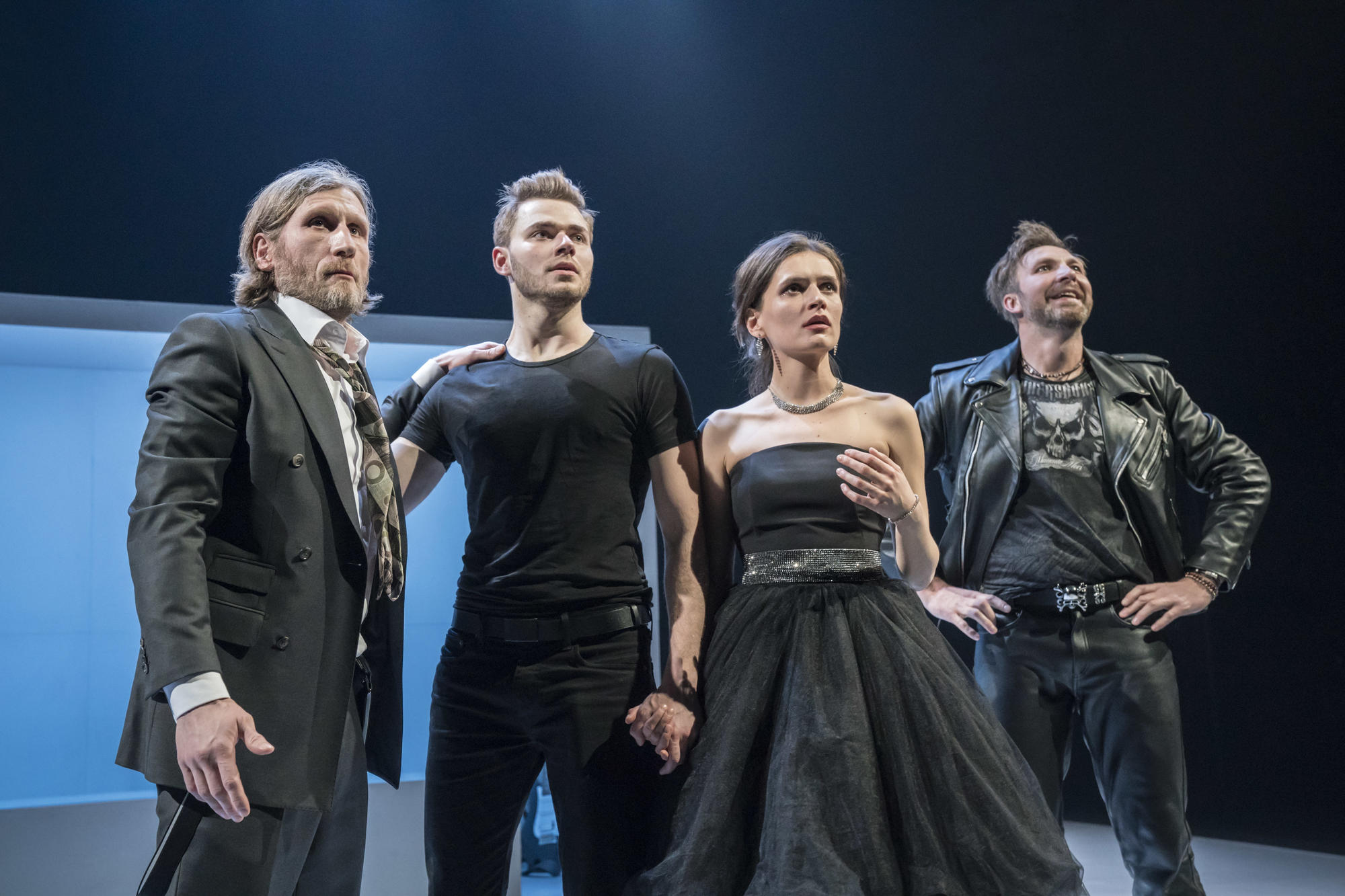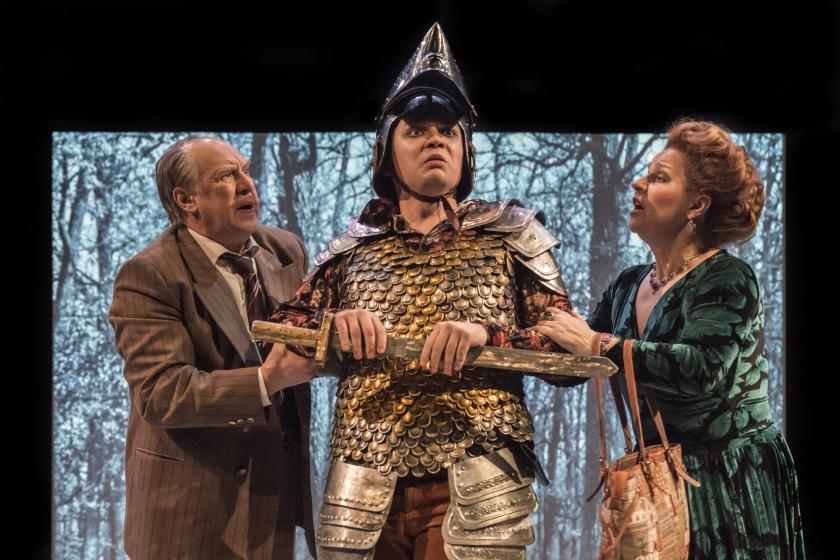This climb-on-stage uprising is led in Beaumont’s original by a London grocer couple, who here become a pair of Russian tourists in the English capital who have only ended up at this show because Lion King was sold out. Intimidated by what they think is going to be high-brow gloom, they intervene to plead for something more entertaining; their demands include their nephew getting his own moments in the spotlight (as the titular, parodic Knight), while they themselves, perched on the edge of proceedings, can dictate the action. Played here by Alexander Feklistov and Agrippina Steklova (main picture), they’re gloriously down to earth, infuriating but somehow lovably so, with an element of innocence that surely harks back to tropes of the Soviet past: they aren’t mouthy in their complaints, rather almost self-consciously apologetic.
Donnellan must have relished casting a satirical eye at this kind of 'concept theatre' The contrast between that “simplicity” and the supposed sophistication of the theatre company is highlighted by the latter’s overtly pretentious style. Donnellan must have relished casting a satirical eye at the kind of “concept theatre”, as it’s described here, that occasionally reaches us from Europe, wickedly sending up some of its trademark elements, such as on-stage, live filming (Feklistov nabs the camera at one point to seek out some dressing-room diversions). The action of Beaumont’s play-within-a-play, titled The London Merchant, proceeds with intentional, perfunctory briskness, including side-swipes at some of the dramatic staples of its time. There's a pronounced Shakespearean presence, even if there’s some line-blurring between what was actually part of Beaumont’s original satire, like a late scene between lovers that surely alludes to Romeo and Juliet, and what’s been incorporated for this adaptation (generous references to Hamlet, as well as the forest journeys of the late plays, must be add-ons, given that The Knight of the Burning Pestle was first performed in 1607, before any of those had been written).
Donellan gives some very contemporary nuance to the two households of that plot, their interaction nicely defined along class lines, the cold aristo formality of the grand Venturewell household set against the rowdy chaos of the Merrythought terraced home. The master of the former takes his hapless would-be son-in-law Humphrey (Andrei Kuzichev) out shooting, while the boozing and Heavy Metal hobbies of the latter’s lord of misrule are what drives his long-suffering wife to flee. (Pictured below, from left, Sergei Miller, Kirill Chernyshenko, Anna Vardevanian, Alexey Rakhmanov) That sort of detail is something that Donnellan always does nicely when he updates action. His staging, as well as Nick Ormerod’s compact design and Irina Kashuba’s nimble choreography, is as agile and skilled as you’d expect from these past masters of pack-up-the-props touring. If the characters feel flimsy, that’s because Beaumont was writing in two dimensions; there’s surely no getting around the ponderous Act IV excursion to Moldavia other than to play it up for visual spectacle as here, though military exhortations to “war” and “victory” sound newly apposite when uttered in Russian. The humour comes across markedly better for those who can understand even a little of the flavoured Russian dialogue, rather than viewers who rely on the surtitles with their ponderous chunks of Beaumont’s original (“arrant noddy” and “caitiff wretch” aren’t the easiest concepts to absorb when they're flitting across the surtitle screen).
That sort of detail is something that Donnellan always does nicely when he updates action. His staging, as well as Nick Ormerod’s compact design and Irina Kashuba’s nimble choreography, is as agile and skilled as you’d expect from these past masters of pack-up-the-props touring. If the characters feel flimsy, that’s because Beaumont was writing in two dimensions; there’s surely no getting around the ponderous Act IV excursion to Moldavia other than to play it up for visual spectacle as here, though military exhortations to “war” and “victory” sound newly apposite when uttered in Russian. The humour comes across markedly better for those who can understand even a little of the flavoured Russian dialogue, rather than viewers who rely on the surtitles with their ponderous chunks of Beaumont’s original (“arrant noddy” and “caitiff wretch” aren’t the easiest concepts to absorb when they're flitting across the surtitle screen).
The star of the show is Steklova. She milks its emotional moments – with real heart, in one surprising central scene that expounds some far more progressive attitudes to women than are otherwise on display here – and plays with shameless skill on the artificiality of the play's main premise, whether she’s breaking in to ask a particular actor (she knows his face from television and rather sweetly nicknames him “cupcake”) for his autograph, or hamming up trying to speak on her mobile in an exaggeratedly hushed voice. Her boisterous readjustment of the closing choreography is an energetic delight, making sure that the show really does go out on the requisite positive note. This Knight isn’t quite the winner that some of Donnellan’s previous Russian riders have been, but it’s an energetic evening that gets the most out of its central conceit.















Add comment